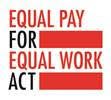Colorado’s New Equal Pay Law


Basics of the EPEWA:
The EPEWA prohibits wage discrimination on the basis of sex (including gender identity), or on the basis of sex combined with another protected status, such as disability, race, creed, color, sexual orientation, religion, age, national origin, or ancestry. In addition, the EPEWA creates several other obligations for employers.
- Prohibitions on the following actions in order to encourage equal pay:
- asking for the wage rate history of a prospective employee;
- relying on wage rate history of a prospective employee to determine a wage rate;
- discriminating or retaliating against a prospective employee for failure to disclose wage rate history;
- discharging, discriminating, or retaliating against an employee for invoking any EPEWA prohibition on behalf of someone else, or assisting in enforcement of any provision;
- discharging, disciplining, discriminating against, coercing, intimidating, threatening, or interfering with, an employee because the employee inquired about, disclosed, compared, or otherwise discussed his or her wage rate;
- prohibiting an employee from disclosing their wage rate; or,
- requiring an employee to sign a waiver or other document that prohibits them from disclosing their wage rate, or purports to deny the employee the right to disclose their wage rate.
- Encouraging wage transparency by requiring the following of employers:
- making reasonable efforts to notify all current employees on the same calendar day (and prior to making a promotion decision) about all opportunities for promotion;
- in each job posting, disclosing the hourly or salary compensation, the range of hourly or salary compensation, and a general description of all other benefits offered to the hired applicant; and,
- Keeping records of job descriptions and wage rate history on all employees for the duration of their employment, plus two years.
In addition, the EWEPA encourages employers to conduct proactive self-evaluations of their compensation practices. Although self-audits do not provide employers with a complete defense, employers may avoid liquidated damage awards if employers can provide evidence of self-audits conducted in order to identify and remedy unlawful pay disparities.
Exceptions:
The EWEPA provides that an employer will not be liable under the statute if the entire difference in wages is accountable to one or more of the following reasons, provided the prior wage rate history of the employee was not relied on to justify any disparity:
- a seniority system;
- a merit system;
- a system that measures earning based on quantity or quality of production;
- the geographic location where the work is performed;
- education, training, or experience to the extent that they are reasonably related to the work in question; or,
- travel, if travel is a regular and necessary condition of the work performed.
Options for Relief:
The EWEPA creates a private right of action for aggrieved employees, as well as other remedies. Employees may still report violations to the Colorado Civil Rights Commission. The Director of the Colorado Department of Labor and Employment is also in the process of developing a possible mediation process for such disputes.
A plaintiff who is successful in private litigation may be awarded damages equal to back pay in the amount of three years. Liquidated damages are also available under certain circumstances. Employers should contact an attorney to prepare policies and procedures to ensure compliance with the EWEPA.
